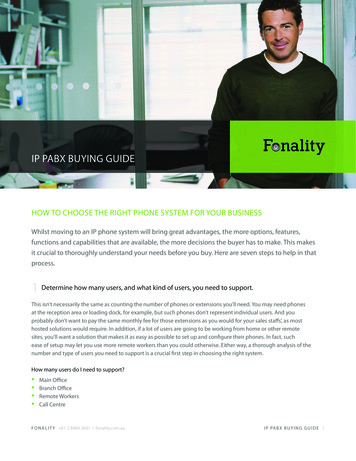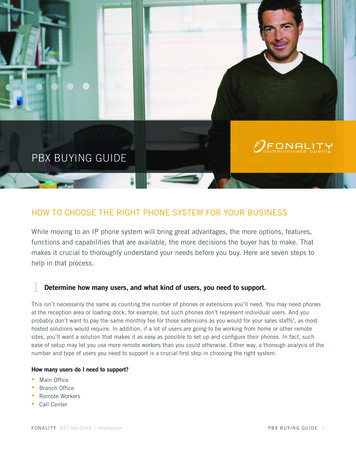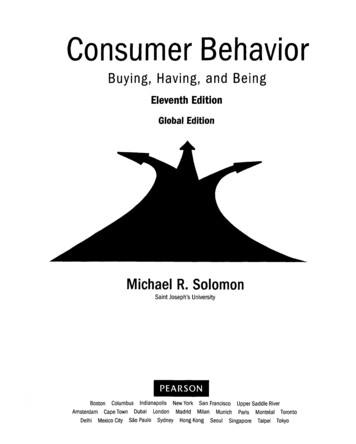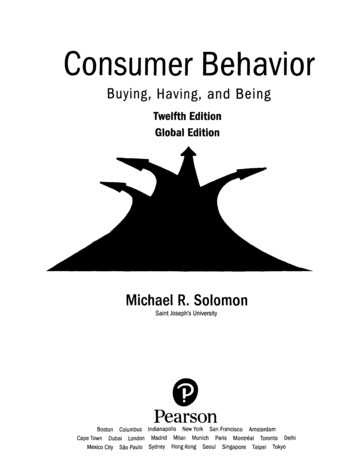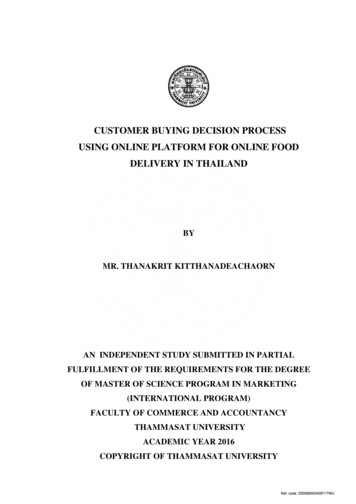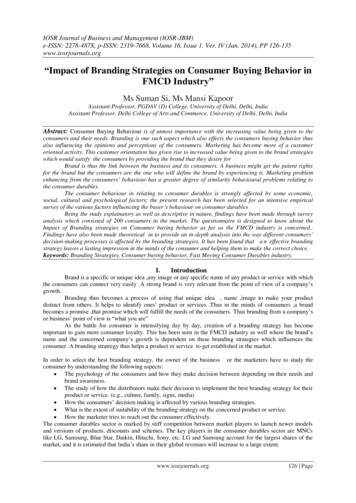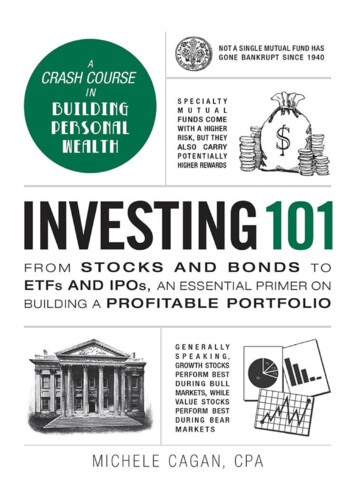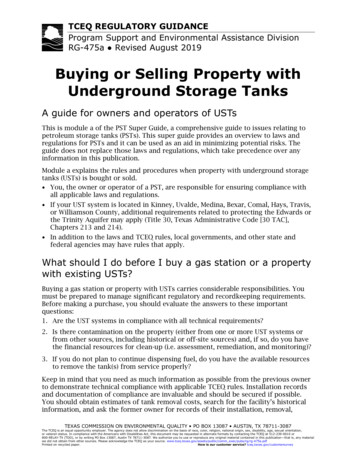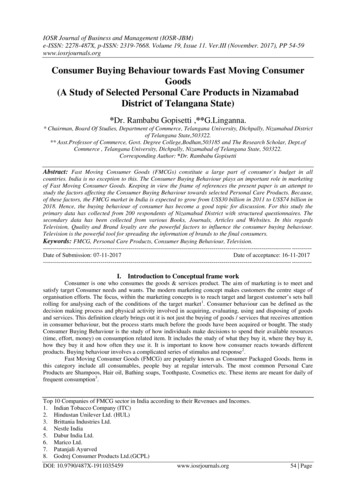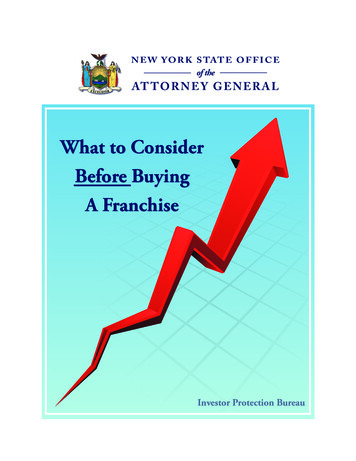
Transcription
N E W Y O R K S TAT E O F F I C Eof theAT T O R N E Y G E N E R A LWhat to ConsiderBefore BuyingA FranchiseInvestor Protection Bureau
Before Buying a Franchise Buying a franchise is a serious investment. If you are considering afranchise purchase, it’s very important that you learn as much as you canabout the many issues facing you. This booklet is a good step towardbecoming an informed investor.There are certainly many individuals who operate successful franchisesusing this unique business format. There are also many who have fallenvictim to scam artists and ended up losing their life savings. Others did notdo enough research or seek professional advice before signing contracts.Without fully understanding the terms of their agreement, they put boththeir investment and their livelihood at risk.In putting together this booklet, we have two major goals:(1) To assist you in avoiding illegitimate franchises set up byscam artists; and(2) To make you better aware of the franchisor-franchiseerelationship and the unequal bargaining power that can existin it.I hope this booklet will assist you in making a decision as to whetherfranchising or a particular franchisor is right for you.
Don’t Let This Happen to YouThe terms of the deal were clear. The franchise agreement spelled it all out clearly:in return for an investment of 20,000 to 50,000, franchisees were given a routealong which to sell the franchisor’s exclusive line of snack and beverage products. Thefranchisees would order the products from the franchisor and sell them to stores, and keepthe profit. They were also advised to buy equipment, rent warehouse space and purchasea truck. However, the products arrived months late and were of poor quality: the potatochips were stale and there were foreign particles in the beverages. Soon after the initialfees were paid, the franchisor closed down his warehouse, stopped answering his phoneand disappeared with the franchisees’ money.This case is real. The Attorney General’s Office brought an action against the scam artistsand achieved a large monetary judgment against the defendants. The victims were normal,everyday people who thought that they were investing in a legitimate franchise business.Tragically, however, they lost their life savings because of a lack of thorough research.They trusted what they were told instead of doing their homework and checking up oneach aspect of the franchise. Consulting with an attorney, accountant, or a knowledgeablebusiness professional would have helped purchasers learn about franchising risks. As itturns out, this Afranchise@ was not registered with the state, and the president and owneralready had a felony conviction: a scheme to defraud. If the franchisees had known whatto consider when buying a franchise, they likely would not have invested.I. Warning Signs of a Fraud1. Failure to Disclose All Necessary Documents and DetailsThe franchisor who will not properly disclose all relevant details to the potentialfranchisee is probably trying to hide something. The franchise may not be profitableor worse, a scam. Before you sign anything, be sure you learn all of the relevantinformation, make sure your questions are answered fully and be certain that thedetails are clear.2. High-Pressure Sales TacticsYou should never feel pressured to buy a franchise or to make your decision quickly,for any reason. Remember that you are making an investment and you should becautious with your decision.3. Claims of Minimal Risk and Promises of Unrealistic ProfitsThere is a risk associated with buying a new franchise. Even the franchisor with themost successful chain cannot legitimately promise that you will make money. Be waryof any franchisor who guarantees that you will make a lot of money with little risk.4. Unjustified Start-Up FeesInitial fees are sometimes very high; and if they seem too high that may be the case.You should know if the initial fees include services or goods that are to be received bythe franchisor before the franchise business opens, and if the fees are refundable. Manycrooked franchisors have sold franchises and disappeared with the initial franchise fee.1
II. The Truth about Legitimate Franchises:What Every Investor Should UnderstandMany franchises are successful because the system creates a certain synergy. Businessesbrought together under one trademark can achieve things not possible for individualbusiness people, such as group advertising and buying power. Along with successcomes a certain number of failures. There are no guarantees. It is vital that potentialfranchisees understand that:Franchises are not guaranteed to make a profit. Even if you own a business which is partof the most successful franchise in the world, your store may lose money, especially inthe beginning. Be prepared to have sufficient savings and financial resources to deal withthis type of situation.A franchise is a long-term investment. You will not get rich quick. It may take youseveral years to develop your business to a point where you have paid off loans andare making the amount of money you anticipated. If your business does not becomeprofitable or you tire of it, you cannot simply close up shop and forget about it. Like it ornot, you must continue to work for the full amount of time agreed to in your contract.Franchisees cannot deviate from the norm under any circumstances. You will be toldexactly how to run your business, right down to how to organize your books or where tokeep the napkins. Even if you believe that the franchisor’s decision is not the best onefor your particular store or regional location, you will be required to follow the rules. Ifyou are a natural entrepreneur with a creative mind, who wants to operate your businessyour own way, franchising is probably not for you.A franchise requires a very large amount of money. The startup fees may number inthe hundreds of thousands of dollars. Make sure you and your family can afford tosustain this kind of loss, should your business fail. There will also be continuous fees forroyalties and advertising which will continue for as long as you own the business. Theymay be quite high and you may not want to pay them after learning the business anddoing all the work, but you will be bound to pay them as part of your contract.You are not guaranteed the right to alternate vending of inventory, product, serviceor supplies beyond those that are disclosed in the franchise disclosure document. Thefranchisor may require you to buy everything you need from an approved vendor orgroup of vendors, even if you know that you could buy the same items elsewhere forsignificantly less. These vendors often charge more than independent vendors becausethey give the franchisor a part of the earnings.The franchisor may be bought out or may go out of business. If the franchisor sells to ormerges with a company that does not understand franchising or if it has different goalsthat allow the system to deteriorate, you may suffer.2
III. Tips for Prospective Franchise Purchasers1. Make sure the seller supplies you with an offering prospectus, also known as afranchise disclosure document, approved by the Office of the Attorney General andthat you read it carefully.Under New York State law you must receive an offering prospectus, alsoknown as a franchise disclosure document (FDD), at least 10 business daysbefore you are asked to sign a contract or pay money to the franchisor. Whenyou receive an FDD you will be asked to sign a receipt for it. Make sure that thedate on this receipt is correct and keep a copy for your records. A dishonestfranchisor may attempt to satisfy the 10-day rule by back-dating the receiptwithout your knowledge. The franchisor may also ask you to consent to theback-dating in order to complete the transaction at an earlier date thanallowed by law. You should refuse. The 10-day rule is designed to afford youtime to thoroughly examine the FDD and make an unhurried decision aboutwhether or not to invest in the franchise. To check if a franchise is registered,call the franchise section of the Office of the New York State Attorney Generalat (212) 416-8236 or (212) 416-8235 or (212) 416-8637.2. Consult with an attorney, an accountant or other professional withbusiness or financial experience in franchising before making paymentsor signing documents.If you cut corners on professional advice, you may well regret it later. Youshould seek professional legal and/or accounting advice, before becoming afranchisee, especially from someone familiar with the field of franchising, tohelp you make an informed decision. An attorney can help you understandthe franchise contract, which is part of the FDD. A number of organizations,including the New York State and American Bar Associations and the AmericanAssociation of Franchisees and Dealers, list attorneys with this experienceon their websites. You can find contact information for these groups in theResources section of this booklet. Ask your attorney to explain complexmatters such as royalty payments, advertising fees, copyright infringement,and the effect of contract violations. Choosing a lawyer you are comfortablewith and that you can afford may take some investigation, but it is worthwhile.Before seeing an attorney, ask about the cost of the initial consultation.An accountant can explain the financial statements that are part of theFDD. These statements tell you whether the franchisor is financially strongand whether the franchise is profitable. If the franchisor is financially weak,consider carefully before you buy; the franchisor may be selling franchises toraise cash just to stay in business. The financial statements can also tell youwhether the franchisor is devoting sufficient funds to the franchising aspectsof the business or keeping most of it as profit. You should not attempt to3
extract this important information from the FDD by yourself unless you haveconsiderable background in these matters or in the type of business that youare considering.Carefully study the estimate of initial expenses contained in the FDD.Franchisors may underestimate these expenses in an effort to make the costof purchasing seem lower than it really is. If the estimate is too low, you mayfind yourself with insufficient cash to carry on until the business produces aprofit. Relying on the FDD without consulting a professional and hoping thatthe franchisor has told the truth is setting yourself up for potential fraud. Atthe end of this booklet, there is a list of associations and government agenciesthat may be able to help you in your research.3. The experience of others can be an effective guide to determining howyou would do as a franchisee.The FDD should disclose the names and addresses of individuals currentlyoperating franchises in New York and adjacent states. Contact them andask them how their franchises are doing. Visit the franchised premises andobserve the volume and type of business being done. Pay attention to thenumber of franchises terminated during the past three years -- an unusuallylarge number may be a telling sign of how the franchisor does business.The FDD should disclose the names and addresses of franchisees that havedropped out of the system within the last year. Contact them to find out whythey dropped out. It is important to communicate with every listed franchisee,if this is practical, or a large sample of them, if it is not. The more you talk to,the more you will learn about the franchisor and the chain. (See Section IX fora list of questions to ask franchisees). If a franchisor offers to supply you witha list of selected franchisees to contact; view this with appropriate suspicion.Those on the list may be Ashills@, franchisees being paid by the franchisorto promote the business. Indeed, if the franchisees on the list are far awayand not likely to be visited personally, they may not be franchisees at all, justdishonest people on the other end of the telephone.4. Look for a territorial protection clause in your contract.Encroachment is one of the most litigated issues in franchising. Whether youare a fast food franchisee who finds another unit has opened up a few blocksaway, an ice cream franchisee who seets his product being sold in the cornergrocery store or a franchisee who discovers that his franchisor is taking ordersover the InternetCall of this can add up to lost profits for a franchisee who hasspent years building up a business.Protected or exclusive territory is the area around the franchisee’s businesslocation in which no other branch of the franchise is allowed to open a store.4
The extent of the protected territory may be defined by the radius from theoutlet’s location, the number of residents, households and businesses in thearea, the number of people living in the area, zip codes, state or highwayboundaries, or some other measure. Sometimes, the franchisee must meetcertain sales quotas or performance standards in order to keep the exclusiveterritory. Before signing the contract, you should determine if the protectedterritory is large enough to support the business objectives if competing withother branches of the franchise.The protected territory clause in the original contract will clarify exactly whatis and is not considered exclusive territory. Courts often uphold the idea thatif there is no specific protected territory clause in the original contract, thefranchisee has no legitimate encroachment claim, so make sure you are clearon exactly where your franchisor can and cannot open stores that will send upcompeting for business with your franchise. Sometimes, the franchisor willmake a deal with an existing franchisee. The franchisor will allow a store toopen within the exclusive territory and the franchisee will receive a percentageof the profits from the new store. This is called a reverse royalty.5. You should understand that although you will be the owner of your ownbusiness and bear the consequences of its success or failure, you willnot be independent.You will be part of a chain and will be expected to conform to rules designed toassure that the product or service which you deliver is of the same quality asthose delivered by the chain’s other franchisees. Uniformity is very importantto a franchise chain and you will be required to follow the rules, even if youhave better ideas of your own. If you are an independently minded person,franchising may not be for you.6. Be aware of non-compete clauses.Even after you have relinquished control of your outlet, you should be awarethat your contract still survives and it will probably contain a non-competeclause. This section prevents you from owning or operating a competingbusiness within a certain geographical area for a specific time period.7. Widespread customer recognition of a trade name is the equivalent ofgoodwill in franchising.The trade name is the symbol of the franchise chain’s quality. Anyone familiarwith a trade name has an idea of the quality it represents. The same is true ofthe name you will be purchasing when you buy a franchise. If the name of afranchise is unfamiliar, you should question whether it’s a good investment.Operating your business under a recognizable franchise name may give you5
have a head start in the marketplace, but it is no guarantee that you will makea profit. No franchisor can guarantee that your outlet will be profitable.The performance of the other franchisees in the chain will also affect thequality associated with the name, as will the leadership and imagination ofthe franchisor itself. If others in the system do a poor job, the ill will whichordinarily attaches to such performance may be transferred to your business.Also, the franchisor’s willingness to advertise and to update the product is ofkey importance. The actions or inactions of a franchisor or other franchiseesmay ruin a franchise name no matter how hard you work.Extra caution should be taken when dealing with a new franchisor or one thatdoes not have its trademark federally registered, because in these situationsthe brand identity of the franchise you have purchased may be at risk. Whattype of trademark protection has the franchisor sought? Are there any possibleconflicts with its marks that could affect you, the franchisee? In the event aproblem arises with the franchisor’s mark or if another chain acquires thefranchise system, does the franchisor have the right to require the franchiseeto change its mark?8. Examine the site selection process outlined in the prospectus, as thelocation of a franchise is very important.A poorly selected location may well doom a franchise. Determine whatthe franchisor will do to help select an appropriate site and whether youwill be able to change the site if it proves to be unsatisfactory. Find out ifrelocation rights are granted to the franchisee in the event of condemnation,lease expiration, or poor business results, or if relocation is determined bythe franchisor’s then-current policy. Is territorial exclusivity included in thecontract? If so, what is the exact nature of the protection? Is it contingentupon performance levels? If the franchisor’s participation in the site selectionprocess appears to be perfunctory, or if the franchisor offers no assistance,think twice about buying. If you are purchasing an existing store or route, findout why the previous franchisee is no longer with the company.9. Training is a distinct advantage of franchising.It enables the franchise operator to acquire skills that an independent operatormight take months or years to develop. If the prospectus does not detail thetraining, ask about it. Also, ask existing franchise operators about the trainingthey received.10.Look for franchisee advisory groups and associations.Both advisory groups and associations are organizations of franchisees, butthey differ in their roles. Advisory groups are organized by the franchisor and6
are composed of franchisees and franchisor representatives. They help thefranchisor make decisions, voice complaints, and form relationships withother franchisees. Franchisee associations, on the other hand, are usuallyindependent of the franchisor. They have their own system of organization,rules and membership requirements. Franchisees pay dues in order tofund the activities of the association. In some cases, an advisory group andan association coexist in the same franchise chain. If your franchise has anassociation or advisory group, it may imply that the franchisor takes therequests and ideas of the franchisees seriously, and these are often strongfranchises. Contact representatives from these groups about whether thefranchisors are responsive to their franchisees.11. Know the franchise seller.A franchise agreement is only as good as the people behind it. The prospectusgives certain information concerning the employment background of thesenior management of the franchisor and their litigation histories. Check thisto see if they have been employed in franchising or a business related to thefranchise being sold. Examine their litigation history. An excessive number ofclaims against them may mean that they have not been performing accordingto their agreements.The franchisor’s experience in selling franchises and managing a franchisechain is important. If the franchisor has little experience in managing a chainof franchises, the guidance, training and other support you receive may beunreliable.7
IV. Two Important Questions about Franchising1. What is a franchise disclosure document (FDD)?A franchise disclosure document, also known as an offering prospectus, is alegal document furnished to a prospective buyer of a franchise, which containsmaterial--that is, significant and important to a prospective franchisee-- pre-saledisclosure information about a franchise business. The FDD includes over 20different items of information about the franchise, including the history of thecompany, required fees and investment costs, information about the franchisor,including any litigation. When you are given the FDD, you must sign and date astatement acknowledging that you received it.2. What is the regulatory framework governing franchises?There are three distinct bodies of law governing franchising: federal and stateregistration and disclosure laws, Afranchise relationship@ laws, and Abusinessopportunity@ laws.State Franchise Registration and Disclosure LawsState registration and disclosure laws provide that, unless an exemption isavailable, no offer or sale of a franchise can take place until the franchisor hasregistered a FDD with the state in which the sale is occurring, the FDD has beenapproved and the potential purchaser has received a copy prior to signing anyagreements. To be approved, a FDD must honestly and in detail explain all of thematerial facts of the franchise and the sale. These registration and disclosure lawsare looking to prohibit misrepresentation in the offering of franchises to potentialbuyers and to make sure that these potential buyers have at their disposal allof the necessary information to make an informed decision. Criminal and civilpenalties may apply to franchisors who do not fully disclose all of the necessaryinformation or who misrepresent the truth. Both state and federal agenciespermit the FDD to largely take the form of the 2008 Franchise Registrationand Disclosure Guidelines, promulgated by the North American SecuritiesAdministrators Association (NASAA). These are available for downloading atwww.nasaa.org.New York LawThe New York Franchise Sales Act states that before any franchise sales activitycan take place in this state, the franchisor is required to submit a FDD forapproval to the New York State Department of Law (The Office of the AttorneyGeneral). “Sales activity in New York” includes all situations in which the sellerlives in New York, the buyer lives in New York, the deal is made in New York, orthe store will be located in New York. Should incomplete or questionable materialbe submitted, the state Attorney General reserves the right to investigate thefranchisor and/or the company.8
A copy of the FDD must be given to the buyer at least 10 days before signingan agreement. Failure to comply with these requirements could result in aninvestigation by the Office of the New York State Attorney General, and may alsoresult in a lawsuit.The Federal Trade Commission Franchise RuleThe FTC Rule states that franchisors must make full pre-sale disclosure in aprospectus, or FDD. However, unlike the New York State law, the FTC Rule doesnot require that the FDD be approved prior to distribution. Enforcement underthe Rule is bolstered by penalties of up to 10,000 per violation.Franchise Relationship LawsA franchise agreement, like any other contract, has a fixed term. Also like anyother agreement, a franchise contract may be terminated before it actuallyexpires. Eighteen states and the District of Columbia (but not New York) haveenacted laws limiting the ability of the franchisor to terminate the deal. Manystates require Ajust cause@ for termination. Just cause is defined as the failureof the franchisee to comply with some aspect of the deal as put forth in thecontract, as well as the failure of the franchisee to correct, or cure, the problemonce it has been pointed out. Other relationship laws address such aspects of thefranchise relationship as discriminatory treatment, market protections, ability offranchisees to belong to franchise associations and the minimum advance noticeof termination or expiration which must be given to franchisees.Business Opportunity LawsTwenty-three states have enacted business opportunity laws. New York is not oneof the states that has a business opportunity law. These laws regulate the sale ofopportunities to engage in new business ventures, so they often impact franchises.The laws require registration and disclosure in the same manner as state franchiseregistration laws do and usually also require the posting of some kind of financialsecurity investment. Some states exclude franchise offerings from businessopportunity laws because they comply with federal or state franchise regulations,while other states hold franchises to both the business opportunity laws and the stateregulations.9
V. The Costs of Buying and Owning a FranchiseMake sure you are prepared to make an investment of a large magnitude before youbuy. Compare your estimates with the estimates of other franchise chains. Will you get abetter deal from a competitor’s franchise?Initial Franchise FeeThe initial franchise fee includes all fees and payments for products and servicesreceived from the franchisor before the business opens. The initial franchise fee isusually non-refundable and paid up front. In some cases, it is payable in installments,but the franchisor must disclose the terms of payment in the contract. Sometimes theinitial franchise fee is deferred or placed into an escrow account until the franchisor hascompletely performed all of its obligations to help the franchisee start up the business.This usually indicates that the franchisor is financially weak or that the franchise isnewly organized.Other FeesThese fees are usually explained in the form of a table which clarifies how much moneymust be paid to whom and when such payments are due. This may include, but is notlimited to, fees for royalties, advertising, transfers (payable only upon a transfer of thefranchise agreement), renewal (payable only upon renewal of the franchise agreement),training, additional support and assistance, and membership in a franchiseemembership organization.Financing the FranchiseAny financing arrangements offered by the franchisor are contained in the FDD.Often, this part will simply indicate that the franchisor does not provide any type offinancing. If any financial aid is provided, the amount, interest rate, required collateral,potential liabilities upon default and any other terms and conditions must be included.Remember that you do not have to use the franchisor or its lender simply because theyoffer to help. Compare loan and lease services at other financial or leasing organizationsas well.10
VI. Rights and Responsibilities of the Franchisee and FranchisorFranchisee ObligationsThe FDD contains information regarding the franchisee’s obligations to buy or leasefrom the franchisor or a supplier designated by the franchisor. The franchisor must alsodisclose any revenues or other benefits it received as a result of any required purchasesor leases. Don’t forget that there are many costs not paid by the franchisor. Be sure toinclude these in your financial estimates.Make sure you understand the circumstances under which you and your familymembers may be held personally liable. Under what circumstances will you bepersonally liable when a customer, vendor or other person sues? Who will beresponsible for the various obligations under the contract? Are there restrictions onother activities of the franchisee and his/her family members with regard to ownership,employment, participation in competitive businesses, etc. Do certain restrictions conflictwith any current or foreseeable business interests of the franchisee or family members?Franchisor ObligationsThe franchisor has many different obligations to you prior to the business opening,during the term of the franchise agreement, relating to site location, providing a trainingprogram, and estimating the length of time needed to open a center following thesigning of a franchise agreement or the payment of a fee to the franchisor.Ask if there is an operations manual. If so, read it carefully. It will tell you whatstandards of operation the franchisor expects of the franchisees. You may have to signan agreement to keep the contents of the manual confidential. Does the manual providefor all aspects of the business? Does it contain an accounting or inventory system?If any of the systems are computerized, is the cost of the computer included in theamounts paid to the franchisor as part of the initial franchise fee?Find out what training you will receive. Will you learn by hands-on experience atanother franchise outlet? If so, how long will you be expected to work there? Will yoube paid? Are you the only one who will be trained or will any employees be trainedas well? Is there a course that the franchisor provides? How long is it? What typeof ongoing training, management assistance and advice will you receive if and whenproblems arise? The amount of training you will need depends on your present businessknowledge and experience and on the operating standards you will be expected to keep.Franchise Financial Performance RepresentationsThe franchisor is not required to include a performance representation in the FDD. Infact, according to the book “Franchising for Dummies”, only about 25% of franchisorsdo so. If the franchisor does not make a claim of this sort, discussing projected earningsis prohibited, whether it is orally or written on the proverbial Acocktail napkin.@ Thereare many reasons why the franchisor may choose not to include a financial performancerepresentation in the FDD. If the numbers turn out to be inaccurate or misleading, the11
franchisee can sue and the franchisor may even be held personally responsible and faceboth civil and criminal charges.Be skeptical about earnings claims. A franchisor will only make a financial performancerepresentation to portray the business in a positive light; for example, using only asmall portion of franchised units in making the financial performance representation.Determine how the franchisor arrived at the numbers. Where are the sampled franchiseslocated? How long has that branch been open and what is its competition? Also,understand that it takes a while for a new business to turn a profit. If you are given anearnings claim, you may not realize that kind of profit for a few years.If a financi
franchising or a particular franchisor is right for you. Don’t Let This Happen to You The terms of the deal were clear. The franchise agreement spelled it all out clearly: in return for an investm
